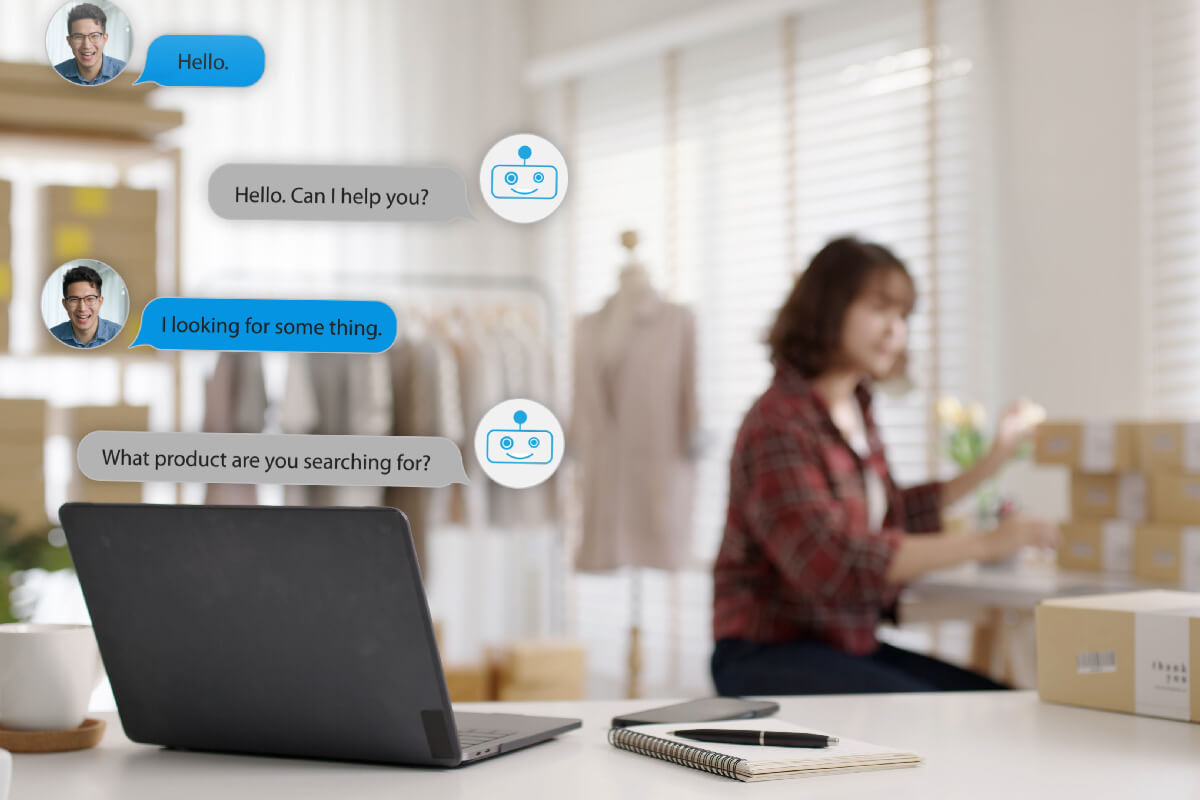The term “artificial intelligence” (AI) is now widespread and can be heard almost anywhere today. Artificial intelligence and automated processes are revolutionizing how companies interact with customers and carry out their daily tasks. 34% of HR leaders invest in workforce learning and reskilling as part of their strategy to prepare for the future of work. The positive outcomes of these new technologies include:
- Increased productivity
- A rise in GDP
- Enhanced capabilities
However, they have also altered our perspective of human workers. In an interview with The New York Times, Elon Musk, a leader in cutting-edge technology, recently predicted that AI would surpass humans within the next five years. This post will discuss some potential occupations that AI and robots could replace soon:
1. Customer service executives
Customer service representatives can do well without a high EQ or EQi. Many companies use artificial intelligence (AI) to handle frequently asked questions and other customer service forms. Chatbots are now also being used to communicate with customers. Many internal queries are also supported.

2. Accounting and data entry
You may have never heard of “bookkeeping” as a job. Implementing AI and ML (Machine Learning) in the product cycle makes sense instead of relying on humans for data entry and bookkeeping.
3. Front-desk staff
Furthermore, using automated check-in systems at hotels, no matter how big or small, will eventually reduce the number of receptionists required. Even fast food restaurants allow customers to place orders via tablet computers or other communication screens. With the advent of AI, robots may soon be able to perform tasks like taking orders.

4. Proofreading
Unlike editing, which emphasizes tone, comprehension, and other factors, proofreading is much simpler. Grammar, syntax, and sentence structure mistakes can all be automatically flagged by various modern editing tools. The popular app Grammarly is one example of a tool used by experts for this purpose.
5. Manufacturing and pharmaceutical jobs
The fear that AI will eliminate jobs is widespread, but perhaps nowhere more so than in the healthcare industry. Since most modern goods are manufactured using mechanized processes, the operational side can also be handled by AI. Robots can even help make pharmaceutical research labs a more secure place for human researchers to work. There will also be a reduction in risks for scientists.
6 Retail sector
The sales process used to be handled by humans, but now it’s all automated. It won’t take long at all for AI to be integrated with the many retailers who are emphasizing self-ordering and payment options. Many large-scale shopping malls have begun using robots instead of employees to analyze customer behavior. Moreover, the high-tech data analysis of AI machines reveals additional products that customers might be interested in.
7. Delivery service
The logistics business has undergone significant social and economic shifts due to AI. It has improved many aspects of the logistics and supply chain. Drones and robots are rapidly automating the delivery industry. When robotic automation takes off in the years to come, it will significantly impact the transportation sector.

8. Doctors
We’re already seeing robot surgeons worldwide perform life-saving procedures. Robotic physicians will provide superior care to patients by providing more precise diagnoses and treatments. Also, the likelihood of infection has decreased because of the increased emphasis on cleanliness and eliminating potential human error.
9. Armed Forces
Experts in the military are confident that autonomous robots will soon dominate future battlefields. The military extensively uses robots for various purposes, including surveillance, intelligence gathering, and many others. According to the head of the British military, “autonomous robots could soon form a quarter of the British army by 2030.”
10. Commercial Workers
The probability of full automation in this industry is 99.8 percent. Entirely autonomous vehicles aren’t far off, and we already have self-driving cars. The Los Angeles Times estimates self-driving trucks will displace 1.7 million American truck drivers in the next decade.
The following are examples of jobs that would remain relevant over time:
-
Human resource
Human Resources departments will always require personnel with interpersonal conflict resolution skills. Our species is unique because we can both think abstractly and act logically. Machines will only be able to take over the job of a human caregiver sometime soon because the latter relies on emotional intelligence. By 2024, this industry is projected to grow by 9%. The probability of robots taking over this industry is 0.55%.
-
Writers
Creators of written content must come up with new ideas and produce material that is wholly their own. The written word is full of unique pieces. In contrast to humans, machines will never be able to create a unique experience for each individual. They have zero capacity for empathy. AI will only be able to replace writers sometime soon because those abilities are essential to the craft. Pre-programmed AIs can do some of this, but they will never be able to replace human creativity.
-
Executives
Executives at the top level are responsible for a wide variety of functions. They have to inspire huge groups of employees. Every effective leader makes use of a wide range of techniques. In the same way that there is no universal recipe for being an effective leader, there is also no universal algorithm that can be taught to artificial intelligence. Because robots lack emotional and mental intelligence, they are not a suitable replacement.
-
Researchers
Wet-lab experiments are only one aspect of a scientist’s work. Neither the inquisitive nature nor the time spent researching can be replaced by a machine. Robots can aid scientists in data analysis, but they lack the capacity for growth or original thought.
-
Clergyman
A minister must wield the authority to lead his congregation in worship and preach. He must demonstrate compassion, emotion, and faith to move people to action. It is only possible to train a robot to win the trust of human beings. However, seeing a futuristic priest who is also AI-enabled would be pretty humorous.

-
Psychologists
Even to the most advanced scientific and medical minds, the human brain’s intricate wiring remains a mystery. It takes tremendous empathy and compassion to connect with everyone. Human thought is too complex for robots to comprehend. Machines have no capacity for empathy or emotional expression. Thus, a robot psychologist is currently impossible.
-
Public relations professionals.
Public relations professionals must rely on their connections to generate interest in their clients’ products and services. They need to get people talking about and talking to others about an issue and get money for it. To rally support for their cause, public relations managers must be able to connect with the public. Due to this stipulation, it will be a secure dwelling for humankind in the years to come.
Conclusion
When the computer was first introduced to streamline business processes, many feared it would lead to a massive loss of employment opportunities. But it settled into daily life and created new types of employment. However, employees needed to acquire new knowledge and develop flexible work habits. It is anticipated that AI will usher in a similar technological revolution. Thus, the future workforce will have to undergo a similar change. The current setup will be modified, and a new employment opportunity will open up. No machine can perform most analytical tasks that necessitate higher-order thinking skills. However, human resources must regularly refresh their knowledge and abilities to remain competitive.
The term “artificial intelligence” (AI) is now widespread and can be heard almost anywhere today. Artificial intelligence and automated processes are revolutionizing how companies interact with customers and carry out their daily tasks. 34% of HR leaders invest in workforce learning and reskilling as part of their strategy to prepare for the future of work. The positive outcomes of these new technologies include:
- Increased productivity
- A rise in GDP
- Enhanced capabilities
However, they have also altered our perspective of human workers. In an interview with The New York Times, Elon Musk, a leader in cutting-edge technology, recently predicted that AI would surpass humans within the next five years. This post will discuss some potential occupations that AI and robots could replace soon:
1. Customer service executives
Customer service representatives can do well without a high EQ or EQi. Many companies use artificial intelligence (AI) to handle frequently asked questions and other customer service forms. Chatbots are now also being used to communicate with customers. Many internal queries are also supported.

2. Accounting and data entry
You may have never heard of “bookkeeping” as a job. Implementing AI and ML (Machine Learning) in the product cycle makes sense instead of relying on humans for data entry and bookkeeping.
3. Front-desk staff
Furthermore, using automated check-in systems at hotels, no matter how big or small, will eventually reduce the number of receptionists required. Even fast food restaurants allow customers to place orders via tablet computers or other communication screens. With the advent of AI, robots may soon be able to perform tasks like taking orders.

4. Proofreading
Unlike editing, which emphasizes tone, comprehension, and other factors, proofreading is much simpler. Grammar, syntax, and sentence structure mistakes can all be automatically flagged by various modern editing tools. The popular app Grammarly is one example of a tool used by experts for this purpose.
5. Manufacturing and pharmaceutical jobs
The fear that AI will eliminate jobs is widespread, but perhaps nowhere more so than in the healthcare industry. Since most modern goods are manufactured using mechanized processes, the operational side can also be handled by AI. Robots can even help make pharmaceutical research labs a more secure place for human researchers to work. There will also be a reduction in risks for scientists.
6 Retail sector
The sales process used to be handled by humans, but now it’s all automated. It won’t take long at all for AI to be integrated with the many retailers who are emphasizing self-ordering and payment options. Many large-scale shopping malls have begun using robots instead of employees to analyze customer behavior. Moreover, the high-tech data analysis of AI machines reveals additional products that customers might be interested in.
7. Delivery service
The logistics business has undergone significant social and economic shifts due to AI. It has improved many aspects of the logistics and supply chain. Drones and robots are rapidly automating the delivery industry. When robotic automation takes off in the years to come, it will significantly impact the transportation sector.

8. Doctors
We’re already seeing robot surgeons worldwide perform life-saving procedures. Robotic physicians will provide superior care to patients by providing more precise diagnoses and treatments. Also, the likelihood of infection has decreased because of the increased emphasis on cleanliness and eliminating potential human error.
9. Armed Forces
Experts in the military are confident that autonomous robots will soon dominate future battlefields. The military extensively uses robots for various purposes, including surveillance, intelligence gathering, and many others. According to the head of the British military, “autonomous robots could soon form a quarter of the British army by 2030.”
10. Commercial Workers
The probability of full automation in this industry is 99.8 percent. Entirely autonomous vehicles aren’t far off, and we already have self-driving cars. The Los Angeles Times estimates self-driving trucks will displace 1.7 million American truck drivers in the next decade.
The following are examples of jobs that would remain relevant over time:
-
Human resource
Human Resources departments will always require personnel with interpersonal conflict resolution skills. Our species is unique because we can both think abstractly and act logically. Machines will only be able to take over the job of a human caregiver sometime soon because the latter relies on emotional intelligence. By 2024, this industry is projected to grow by 9%. The probability of robots taking over this industry is 0.55%.
-
Writers
Creators of written content must come up with new ideas and produce material that is wholly their own. The written word is full of unique pieces. In contrast to humans, machines will never be able to create a unique experience for each individual. They have zero capacity for empathy. AI will only be able to replace writers sometime soon because those abilities are essential to the craft. Pre-programmed AIs can do some of this, but they will never be able to replace human creativity.
-
Executives
Executives at the top level are responsible for a wide variety of functions. They have to inspire huge groups of employees. Every effective leader makes use of a wide range of techniques. In the same way that there is no universal recipe for being an effective leader, there is also no universal algorithm that can be taught to artificial intelligence. Because robots lack emotional and mental intelligence, they are not a suitable replacement.
-
Researchers
Wet-lab experiments are only one aspect of a scientist’s work. Neither the inquisitive nature nor the time spent researching can be replaced by a machine. Robots can aid scientists in data analysis, but they lack the capacity for growth or original thought.
-
Clergyman
A minister must wield the authority to lead his congregation in worship and preach. He must demonstrate compassion, emotion, and faith to move people to action. It is only possible to train a robot to win the trust of human beings. However, seeing a futuristic priest who is also AI-enabled would be pretty humorous.

-
Psychologists
Even to the most advanced scientific and medical minds, the human brain’s intricate wiring remains a mystery. It takes tremendous empathy and compassion to connect with everyone. Human thought is too complex for robots to comprehend. Machines have no capacity for empathy or emotional expression. Thus, a robot psychologist is currently impossible.
-
Public relations professionals.
Public relations professionals must rely on their connections to generate interest in their clients’ products and services. They need to get people talking about and talking to others about an issue and get money for it. To rally support for their cause, public relations managers must be able to connect with the public. Due to this stipulation, it will be a secure dwelling for humankind in the years to come.
Conclusion
When the computer was first introduced to streamline business processes, many feared it would lead to a massive loss of employment opportunities. But it settled into daily life and created new types of employment. However, employees needed to acquire new knowledge and develop flexible work habits. It is anticipated that AI will usher in a similar technological revolution. Thus, the future workforce will have to undergo a similar change. The current setup will be modified, and a new employment opportunity will open up. No machine can perform most analytical tasks that necessitate higher-order thinking skills. However, human resources must regularly refresh their knowledge and abilities to remain competitive.





